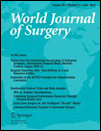Borderline Resectable Adrenal Cortical Carcinoma: A Potential Role for Preoperative Chemotherapy
Abstract
Background
Adrenal cortical carcinoma (ACC) may have tumor or patient characteristics at presentation that argue against immediate surgery because of an unacceptable risk of morbidity/mortality, incomplete resection, or recurrence. This clinical stage can be characterized as borderline resectable ACC (BRACC). At present, systemic therapies in ACC can reduce tumor burden in some patients, creating an opportunity in BRACC for a strategy of preoperative chemotherapy (ctx) followed by surgery.
Materials and Methods
A single-institution retrospective review was conducted of all patients considered for surgery for primary ACC. Patients with BRACC treated with preoperative ctx were categorized as follows: group A, imaging suggesting a need for multiorgan/vascular resection; group B, imaging suggesting potentially resectable oligometastases; and group C, patients having marginal performance status/comorbidities precluding immediate surgery. Both the disease-free survival (DFS) and the overall survival (OS) were compared in BRACC patients treated with preoperative ctx+surgery and those who had upfront surgery.
Results
Fifty-three patients with primary ACC were considered for surgery (median follow-up: 49.9 months). Thirty-eight patients (71.7 %) had initial surgery and 15 of them (28.3 %) were considered BRACC and received preoperative therapy. Of these 15 patients, 12 (80 %) received combination therapy with mitotane and etoposide/cisplatin-based ctx, 2 (13 %) received mitotane alone, and 1 (7 %) received ctx alone. Six patients were defined as group A, 5 as group B, and 4 as group C. Thirteen (87 %) BRACC patients underwent surgical resection. BRACC patients were younger but had more advanced disease than the patients having initial surgery (stage IV in 40 vs 2.6 % [p < 0.01]). By Response Evaluation Criteria In Solid Tumors criteria, 5 patients (38.5 %) had a partial response, 7 (53.8 %) had stable disease, and 1 (7.7 %) had disease that progressed. Postoperative mitotane use was similar between groups (p =. 15). Median DFS for resected BRACC patients was 28.0 months [95 % confidence interval (CI), 2.9–not attained] vs 13 months (95 % CI, 5.8–46.9) (p = 0.40) for initial surgery patients. Five-year OS rates were also similar: 65 % for resected BRACC vs 50 % for initial surgery (p = 0.72).
Conclusions
The favorable outcome of patients with BRACC, despite more advanced stage of disease compared to those treated with surgery first, together with uncommon disease progression, suggests a benefit of neoadjuvant treatment sequencing in patients with BRACC.




